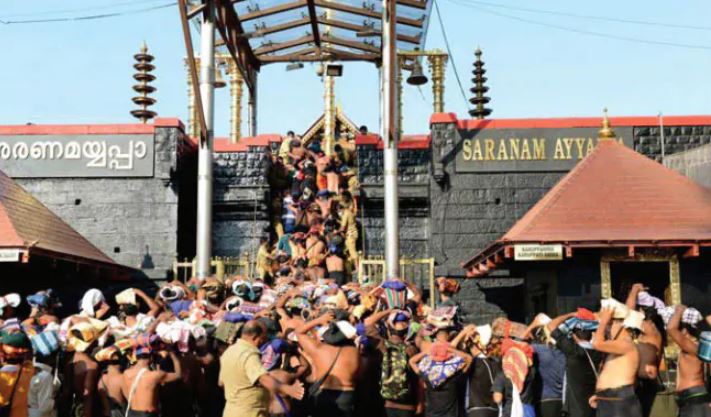 English
English

The Supreme Court on Friday allowed the entry of women in Kerala’s Sabarimala temple.

New Delhi: The Supreme Court on Friday removed all restrictions imposed by Sabarimala Temple with regard to entry of women between the ages of 10 to 50. While pronouncing the order Chief Justice of India (CJI) Dipak Misra said that the ban in place violated Constitutional principles and that women's rights cannot be subverted as they are in no way less than men.
Allowing women of all ages to enter the holy site, the court said that no physiological and biological factor can be given legitimacy if it doesn't pass the test of conditionality. The top court said that devotees of Lord Ayyappa are Hindus and do not constitute a separate religious denomination, while adding that restrictions put by Sabarimala temple cannot be held as essential religious practice.
Also Read: SC upholds constitutional validity of Aadhaar
On one hand, women are worshipped as Goddesses, but there are restrictions on the other hand, said CJI Misra while reading the judgement. "Relationship with God can't be defined by biological or physiological factors," he added.
The verdict was pronounced by the bench presided by CJI Dipak Misra and comprising Justices Rohinton Nariman, AM Khanwilkar, DY Chandrachud and Indu Malhotra, in which Justice Malhotra had a dissenting view.
Reacting to the landmark verdict, A. Padma Kumar, Kerala Devaswom Boardpresident said that the Board will file a review petition in the case. Sabarimala Temple is run by the Devaswom Board.
On August 1, the five-judge Constitution bench had reserved its judgement on the petitions challenging the ban after hearing the case for eight days.
Also Read: SC says no coercive action against Salman Khan produced movie 'Loveratri'
During the course of the hearing, CJI Misra had observed that even the deity ofSabarimala Temple has rights with respect to certain aspects, including 'Right to Privacy', but the same has to be tested on Constitutional legitimacy. Another judge, Justice D.Y. Chandrachud had stated that the right to pray is equal for both men and women.
Before that on July 26, the Pandalam Royal family challenged the petition seeking entry of women into the temple, terming it 'mischievous' on grounds of being against practices of the Hindu faith.
he lawyer appearing on their behalf had told the court that the temple deity, Lord Ayyappa, is an eternal celibate and therefore women of menstruating ages should not be allowed in the premises.
Also Read: Supreme Court declines to refer Ayodhya dispute to larger bench
While the Kerala government initially supported the ban, it later changed track and in 2016 it told the top court that it was ready to allow women inside the sanctum sanctorum of the temple.
As per norms prescribed by the temple board women of menstruating ages were prohibited from visiting the premises. The rules which mandate the ban are listed in the Kerala Hindu Places of Public Worship (Authorisation of Entry) Rules of 1965.
Also Read: Adultery is unconstitutional, says Supreme Court
The petition challenging the ban was filed in the Apex Court by Indian Young Lawyers Association over a decade ago in 2006, alleging that the rule violates the freedom to follow and propagate religion, listed in Article 25 of the Indian Constitution.
The matter was referred to a three-judge bench two years later in 2008. The case came up for hearing seven years later in 2016 and was referred to a Constitution bench in February 2017.
Sabarimala Temple, a prominent Hindu pilgrimage site, is set in the hilly forests of Kerala. In January this year, the temple authorities had made it mandatory for female devotees to furnish their age proof while visiting. The decision came after a number of women from the banned age group were detained while entering Sabarimala. (ANI)